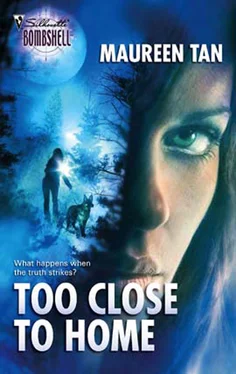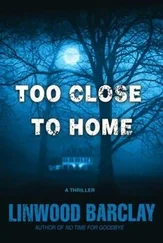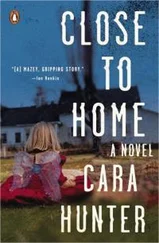If Chad could manage to approach this case with professionalism and some measure of detachment, so could I.
Until the forensics report came in, I would avoid speculating about who the murder victim—and the murderer—might be. I would investigate this crime just as I’d investigate any other crime. I would work with Chad and we would build our case carefully and meticulously. Basing it on facts, likely circumstances and evidence.
And if the investigation pointed to someone I loved? Threatened to expose facts long buried?
My stomach did a half twist, destroying my sense of calm.
Just do your job, I told myself. The way you were taught. One step at a time. Follow the evidence wherever it leads.
Then deal with the consequences.
Dear Reader,
Have you been lost and alone in a forest at night?
During a search-and-rescue training exercise, I put myself in that situation, experiencing the disorientation and terror that real victims often feel. My imagination ran wild as small forest noises became threatening sounds and uneven darkness tricked me into seeing shadowy forms. At one point, I was sure that ticks were raining down on me from the trees overhead and I fought the impulse to run away screaming. You can imagine my relief when a young German shepherd crashed through the underbrush with his human handler fast at his heels.
That night and my love of dogs were the inspiration for Too Close to Home’s heroine, rookie cop and search-and-rescue volunteer Brooke Tyler. Brooke’s fictitious adventures play out against a real and often treacherous backdrop—the atmospheric Shawnee National Forest area of southern Illinois. From the murky water of a cypress swamp to towering river bluffs to forested hills cut with jagged ravines, Brooke must confront and overcome challenges.
An intriguing geography of the heart is as important to me as the story’s physical geography. Brooke’s world is complicated by her family’s commitment to helping abused women escape to safety. No sooner than she’s found the man she’ll love forever, she’s sacrificed that relationship to protect her family’s dangerous legacy. The question is, can she live with her heartbreaking decision and overcome perils that strike Too Close to Home?
Maureen Tan
Too Close to Home
Maureen Tan
www.millsandboon.co.uk
Silhouette Bombshell
A Perfect Cover #9
Too Close to Home #108
is a Marine Corps brat, the eldest of eight children and naturally bossy. She and her husband of thirty years have three adult children and two grandchildren. They currently share their century-old house with a dog, three cats, three fish and a rat. Much to his dismay, their elderly Appaloosa lives in the barn. Most of Maureen’s professional career has involved explaining science, engineering and medical research to the public. To keep her life from becoming boring, she has also worked in disaster areas as a FEMA public affairs officer and spent two years as a writer for an electronic games studio. Maureen’s first books, AKA Jane and Run Jane Run, detail the exploits of a female British agent.
For the kind and hospitable folks of Elizabethtown, Illinois. For my family and friends of all generations. For my mother, who taught me reading and courage and love. And especially for Peter, who still looks good in jeans.
Prologue
Chapter 1
Chapter 2
Chapter 3
Chapter 4
Chapter 5
Chapter 6
Chapter 7
Chapter 8
Chapter 9
Chapter 10
Chapter 11
Chapter 12
Chapter 13
Chapter 14
Chapter 15
Chapter 16
Chapter 17
Chapter 18
Chapter 19
Chapter 20
Epilogue
I was sixteen. Old enough that I no longer believed in story-book monsters. Young enough that, despite plenty of evidence to the contrary, I didn’t quite believe in human monsters.
Dr. Porter changed that.
“I’m getting tired of waiting,” he called from the vicinity of the living room. “Come take your punishment like a good little wife.”
His coaxing, reasonable voice was accompanied by the rhythmic slapping of a leather strap against an open hand. The sound echoed off the glossy, hard surfaces of the expensive suburban home and carried clearly into the kitchen at the back of the house.
“Obviously, you’ve forgotten who your master is,” he continued. “You must be reminded.”
From where I stood, I couldn’t see Dr. Porter. Or the strap. But I’d seen the welts and bruises left by the strap. Left by Dr. Porter on his wife’s flesh. So maybe that was why it was all too easy to imagine what he looked like. No matter that I knew better, that Aunt Lucy and Gran had more than once reminded me that appearance was a poor predictor of behavior, I couldn’t help but picture bulging muscles and twisted, lunatic features.
Nothing about his voice convinced me otherwise. And because my upbringing was Baptist and biblical, I imagined it was the same voice the serpent had used in the Garden of Eden. Low, vaguely seductive and absolutely evil.
“It will only be worse if I have to come get you, Missy.”
My name was Brooke. Not Missy. Missy Porter was gone. And monster or not, devil or not, I stood my ground and waited for her husband. Because that was what I’d promised Missy I would do.
Just moments earlier, when the lock had turned in the front door, she’d been standing beside me in the kitchen. I’d watched as the blood drained from her face and she began trembling.
Missy was terrified. With good reason. Earlier that day, her husband had come home unexpectedly and found her packing. Missy’s punishment began before he’d left the house and he’d promised to continue it when he returned. In the meantime, he’d taken their twin sons away with him, confident that she would never run away without her children.
When we’d first arrived, she hadn’t answered the door. Fearing that Dr. Porter’s escalating abuse had turned homicidal, Gran and I crept around the house trying to get a glimpse inside. We found an open window, shouted Missy’s name again, and heard a woman sobbing.
Right then, I’d seen in Gran’s face that she wished Aunt Lucy was at her side. But Aunt Lucy was home with a broken leg and—no matter that I was nothing more than a gawky adolescent girl with boring brown eyes and chopped-off brown curls—I was her replacement on this rescue. Mostly because, unlike Gran, I could see well enough to drive after dark. I was also undeniably more nimble than Gran. Reluctantly, she agreed that I should crawl inside. Without saying a word, she gave me the big leather handbag that concealed my grandfather’s gun.
I’d found Missy in the kitchen, sitting naked on the stool where her husband had ordered her to stay, urine puddling on the floor beneath her. Horrified and unsure of what to do or say, I ran to the kitchen door and let Gran in. Valuable time passed as she convinced Missy to leave the stool, to escape as planned. Then Gran stood guard on the front porch and I waited inside as Missy got dressed.
We were almost to the foyer when the doorbell rang three times. A warning that Dr. Porter was approaching. Gran’s usual tactic—posing as a neighbor in search of a lost cat—bought us enough time to backtrack to the kitchen. And in that time, Missy lost her nerve.
As her husband bellowed for her from the front of the house, she stood, indecisive, unable to chose between the promise of escape and the certainty of abuse, between the risk of directing her own life and the terror of letting her husband control it. With her children in the balance, the decision was agony. And it was hers alone. In the end—with the sound of her husband’s heavy steps echoing down the hallway toward us—she chose survival.
Читать дальше












